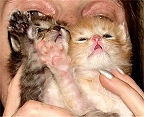http://www.aspca.org/news/national/11-20-09.html
1. Swine Flu Infects Housecat—Are Your Pets Safe?
Ever since the news broke earlier this month that an American cat caught the swine flu, rumors about how pets can catch this disease have been spreading—but we're here to set the record straight!"On November 2, test results confirmed that a pet cat in Iowa was infected by the H1N1 (swine flu) virus, which was most likely transmitted by human family members," reports Dr. Louise Murray, Director of Medicine at the ASPCA. "All family members, including the cat, have now recovered. In unrelated incidents in other states, a few pet ferrets also recently tested positive for H1N1, and one of them has died.” Although we already knew that infected humans could transmit H1N1 to both pigs and turkeys, these are the first reported cases of the virus affecting cats and ferrets.
According to Dr. Murray, there are no known instances of a dog catching H1N1 (but remember, it is flu season, and your dogs are still susceptible to catching other flu bugs). In addition, there is currently no evidence that H1N1 can be passed from pet to human—it seems to be going only the other way, with people transmitting the illness to their pets.
A little common sense will go a long way in decreasing the likelihood of passing the illness on to your pets. If members of your household are exhibiting flu-like symptoms, the ASPCA recommends protecting your pets by:
- washing hands thoroughly,
- covering coughs and sneezes and
- avoiding close contact with pets during the course of the illness.
In fact, if you’re sick, it’s a good idea to give your pets a place other than your bedroom to sleep at night until you get better.
If any pet displays symptoms such as lethargy, loss of appetite, coughing, sneezing or difficulty breathing—especially if a human family member has recently suffered from influenza—please contact your veterinarian.

